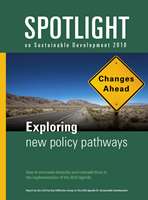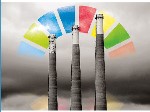Published on Wed, 2019-04-10 10:55
The Economic and Social Council (ECOSOC) Partnership Forum will hold its annual session at UN headquarters on 11 April 2019. This year it will focus on partnership efforts supporting the 2030 Agenda for Sustainable Development and its Sustainable Development Goals (SDGs). The 2030 Agenda is the subject of review by the High-Level Political Forum on Sustainable Development (HLPF) annually under ECOSOC and at summit level every four years (including 2019) under the auspices of the UN’s highest political body, the General Assembly. |
Published on Wed, 2019-04-10 00:00
Promoting the Decent Work Agenda (DWA) remains the main objective of the trade union input into the 2030 Agenda. Based on rights and democratic ownership, the DWA is the foundation for sustainable development, as opposed to palliative interventions. Human and labour rights, freedom of association and collective bargaining and social dialogue are not only essential ingredients for sustainable economic growth but are the pillars of democracy-building. Building and fortifying democratic processes is in turn the cornerstone of just development. |
Published on Wed, 2019-04-10 00:00
Promoting the Decent Work Agenda (DWA) remains the main objective of the trade union input into the 2030 Agenda. Based on rights and democratic ownership, the DWA is the foundation for sustainable development, as opposed to palliative interventions. Human and labour rights, freedom of association and collective bargaining and social dialogue are not only essential ingredients for sustainable economic growth but are the pillars of democracy-building. Building and fortifying democratic processes is in turn the cornerstone of just development. |
Published on Tue, 2019-04-02 08:57
Governments have dedicated a pivotal role to the private sector in the implementation and financing of the 2030 Agenda and the SDGs. This has pushed a turn towards the private sector, the promotion of multi-stakeholder partnerships between public and private actors. However, far too often there is a considerable gap between the social and environmental commitments companies make publicly in political fora like the UN and the actual effects of their production patterns and investment strategies on people and the environment. |
Published on Tue, 2019-04-02 08:50
Recent discoveries of hydrocarbons in various African countries and the massive investments in energy generation capacity have created expectations that the blackouts and brownouts that several African countries have endured for the past decades will soon be a thing of the past. In East Africa, national economies have in recent years also been recording stellar growth rates which promise new opportunities and discontinuity with the past. Despite this record, in its Africa Energy Outlook 2014, the International Energy Agency remarked: “More than 200 million people in East Africa are without electricity, around 80% of its population. Ethiopia, Kenya and Uganda are among the most populous countries in East Africa and have the largest populations both with and without access to electricity.” |
SUSCRIBE TO OUR NEWSLETTER





